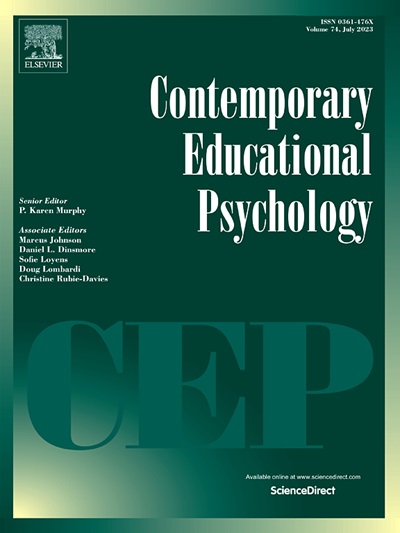Overwhelmed receivers and overly ambitious providers: How the Impacts of peer comment features look different at receiver and provider levels of aggregation
IF 3.8
1区 心理学
Q1 PSYCHOLOGY, EDUCATIONAL
引用次数: 0
Abstract
Although research has explored what makes peer feedback useful, few studies have compared perceived helpfulness with actual implementation during revision. Additionally, previous studies often analyze individual feedback comments in isolation, rather than considering the overall feedback received by receivers or provided by providers. The present study explored the relationship between various comment features and their perceived helpfulness and implementation, predicting different relationships on the basis of an adapted Student-Feedback Interaction Model. The study also assessed whether these relationships exhibited aggregation effects at the levels of receiver or provider, predicting effects based upon cognitive/workload theory. Peer feedback data were analyzed from 844 students engaged in online peer feedback, who also evaluated the helpfulness of received comments. Comments were coded for suggestions, explanations, being long, and being implemented in a revision. Relationships with perceived helpfulness and implementation were examined at the individual comment, receiver, and provider levels. Multiple regressions showed that perceived helpfulness was predicted by comment length and the presence of suggestions whereas comment implementation was predicted by length and the presence of explanations, supporting the adapted model. In addition, feedback receivers appeared to be overwhelmed by receiving too many suggestions when judging helpfulness, and feedback providers appeared to provide less helpful explanations for revision when attempting to provide many explanations. These findings suggest that simply recommending greater use of feedback styles found helpful at the individual comment level may produce counter-productive effects for both feedback receivers and providers.
不堪重负的接受者和过于雄心勃勃的提供者:在接受者和提供者的聚合水平上,同伴评论特征的影响是如何不同的
虽然研究已经探索了是什么让同伴反馈有用,但很少有研究将在复习过程中感知到的帮助与实际执行进行比较。此外,以前的研究经常孤立地分析个人反馈意见,而不是考虑接收方收到的或提供方提供的总体反馈。本研究探讨了各种评论特征与其感知的帮助性和实施之间的关系,并基于一个适应性的学生反馈互动模型预测了不同的关系。该研究还评估了这些关系是否在接受者或提供者的水平上表现出聚集效应,并基于认知/工作量理论预测了影响。研究人员分析了844名参与在线同伴反馈的学生的同伴反馈数据,这些学生还对收到的评论的帮助程度进行了评估。注释被编码为建议、解释,很长,并在修订中实现。在个人评论、接受者和提供者级别上检查了感知帮助和实现的关系。多元回归表明,评论长度和建议的存在可以预测感知的帮助性,而评论的实现可以通过长度和解释的存在来预测,支持了调整后的模型。此外,在判断是否有帮助时,反馈接受者似乎因收到太多建议而不知所措,而反馈提供者在试图提供许多解释时,似乎对修改提供的帮助较少。这些发现表明,简单地建议更多地使用在个人评论层面上有用的反馈风格,可能会对反馈的接受者和提供者产生适得其反的效果。
本文章由计算机程序翻译,如有差异,请以英文原文为准。
求助全文
约1分钟内获得全文
求助全文
来源期刊

Contemporary Educational Psychology
PSYCHOLOGY, EDUCATIONAL-
CiteScore
16.50
自引率
3.90%
发文量
74
期刊介绍:
Contemporary Educational Psychology is a scholarly journal that publishes empirical research from various parts of the world. The research aims to substantially advance, extend, or re-envision the ongoing discourse in educational psychology research and practice. To be considered for publication, manuscripts must be well-grounded in a comprehensive theoretical and empirical framework. This framework should raise critical and timely questions that educational psychology currently faces. Additionally, the questions asked should be closely related to the chosen methodological approach, and the authors should provide actionable implications for education research and practice. The journal seeks to publish manuscripts that offer cutting-edge theoretical and methodological perspectives on critical and timely education questions.
The journal is abstracted and indexed in various databases, including Contents Pages in Education, Australian Educational Index, Current Contents, EBSCOhost, Education Index, ERA, PsycINFO, Sociology of Education Abstracts, PubMed/Medline, BIOSIS Previews, and others.
 求助内容:
求助内容: 应助结果提醒方式:
应助结果提醒方式:


